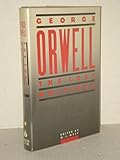Orwell's job during WWII was to translate news broadcasts into Basic English, with a 1000 word vocabulary[2], for broadcast to the colonies, including India. The British had a scheme at the time to get everyone in the colonies to speak at least Basic English, and this was part of it.
Orwell observed that translation into Basic English is a political act. Some concepts are very difficult to express in Basic English. Political ambiguity does not translate at all.
Hence Newspeak.
As for "part of the horror of his picture of 1984 is his eloquent description of the low quality of the gin and tobacco," that comes from the Ministry of Information's canteen, described by other ex-employees as "dismal".
"Big Brother" seems to have been a senior staffer at the Ministry of Information, who was actually called that (not to his face) by staff.
[1] http://www.amazon.com/Orwell-Lost-Writings-George/dp/0877957... [2] https://xkcd.com/1133/


It's a good exercise to put complicated ideas into very simple language.
George Orwell had that job during World War II. The BBC used to broadcast news to the British Empire in India and Hong Kong, using Basic English. Orwell's job was to translate the news into Basic English. He later wrote that this is a political act. Converting news to Basic English means taking all the ambiguity out. If a political statement was ambiguous, removing the ambiguity means making a political decision. Someone has to decide what the statement really means.
That's where Newspeak, in "1984", came from.[1]
[1] "Orwell, The Lost Writings", https://www.amazon.com/Orwell-Lost-Writings-George/dp/087795...